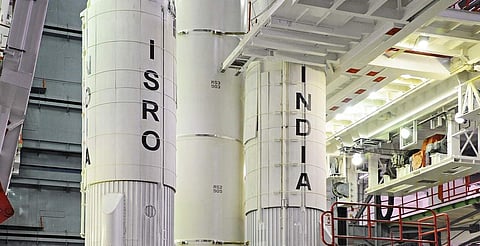

CHENNAI: Chennai start-up Agnikul Cosmos is building India’s first private small satellite rocket and will be seeking the help of Indian Space Research Organisation (ISRO) for conducting ground tests. The IIT-Madras incubated start-up received a much-needed boost with the announcement of Indian National Space Promotion and Authorisation Centre (IN-SPACe), an autonomous body under the Department of Space, which would help private prayers gain access to ISRO infrastructure.
Named ‘Agnibaan’, the rocket will be a two-stage LOX/Kerosene vehicle with a third “baby stage.” The launch vehicle will be capable of carrying up to 100 kg of payload to low-Earth orbits up to 700 km with a plug-and-play engine configuration.
Srinath Ravichandran, co-founder and CEO, Agnikul Cosmos, confirmed to Express that the rocket would be ready by 2022. “We have realised the engine for the upper stage or third stage. Design work is on for the first and second stage engines. Seven identical engines using 3D printing will be fitted to the first stage, while one engine each will be used for second and third stages. Basically, it will be a modular rocket that can be customised depending on client’s requirement,” Ravichandran said.
The vehicle will be powered by semi-cryogenic fuel, he added. The rocket’s height will be 18 metres and weigh about 13 tonne at liftoff. The start-up has raised `26 crore recently from various sources, which will be used for ground testing, fabrication and expanding the team. The company is operating out of the National Centre for Combustion Research and Development (NCCRD) at IIT-Madras.
SR Chakravarthy, head of NCCRD and founder-adviser of Agnikul, told Express that ISRO’s help would be needed during the testing stage. “In view of safety and security, we would prefer to use ISRO testing facilities and this is where the role of IN-SPACe would come in handy.” Ravichandran said the whole purpose of ‘Agnibaan’ is to eliminate the long wait periods for nano and micro satellite launches. At present, small satellites are carried as piggyback luggage by bigger rockets.
“We will be able to build a rocket within two weeks from the date of order and it can be launched from any launch site,” Ravichandran said. Besides Agnikul, there are two other Indian start-ups working on building small satellite vehicles. Bellatrix is building a ‘Chetak’ launch vehicle designed to deliver a 50-kg payload. The other start-up is Skyroot, which is working on ‘Vikram’ series of launch vehicles.